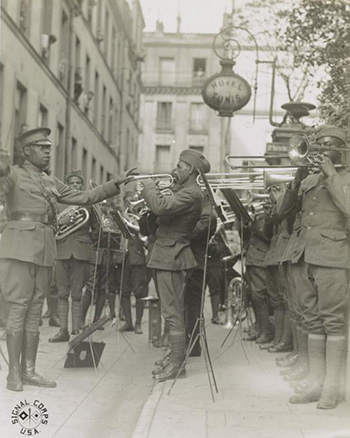by Jarrett Hoffman

. Cleveland International Classical Guitar Festival announces 2023 line-up
. Almanac: Happy birthday James Reese Europe
HAPPENING TODAY:
No concerts on the horizon today, probably because it’s Ash Wednesday, the first day of Lent in the Christian calendar.
ANNOUNCEMENTS:
The Cleveland International Classical Guitar Festival has announced its 2023 line-up. To be held at the Cleveland Institute of Music on June 1-4, the Festival will include concerts, master classes, lectures, guitar demonstrations, and the Stroud Youth Competition semi-final and final rounds. Featured artists: Jason Vieaux (USA), guitar; Mari Sato (USA), violin; Petra Polácková (Czech Republic), guitar; Nigel North (England), baroque lute; SoloDuo (Italy), guitars; Patterson/Sutton Duo (USA), cello and guitar; Hao Yang (China), guitar; and Jonathan Leathwood (England), guitarist and lecturer. Click here for more information and concert tickets.
ALMANAC FOR FEBRUARY 22:
By Jarrett Hoffman
Among the figures in music history to celebrate today is one who deserves a great deal more recognition than he gets. American composer, arranger and bandleader James Reese Europe (pictured in a Signal Corps photo) was born on February 22, 1881 in Mobile, Alabama, and has been dubbed “the Martin Luther King of music” not only for his compositional and orchestrational innovations, but also for his leadership as a Black musician in New York City in the early 20th century.
That leadership included forming the Clef Club in 1910, an organization that housed its own orchestra and chorus, in addition to serving as a union and contracting agency for Black musicians. One famous performance by the Clef Club Symphony Orchestra came at Carnegie Hall in 1912: a highly successful program that featured exclusively Black composers and an enormous and unique ensemble. Its numbers totaled 125 musicians, and it combined traditional orchestral forces with banjos, mandolins, and guitars.
Carnegie Hall has termed that concert “day one of jazz” at the venue, while acknowledging that the description might be misleading to a contemporary audience:
To modern ears, the proto-jazz mixture of ragtime, blues, and minstrelsy played by the Clef Club Orchestra may not sound much like the jazz most would recognize from 20 years later, but this should not overshadow Europe’s importance as one of the first to translate “syncopated music” to a large ensemble.
The question of Europe’s genre is also tackled by jazz historian David Sager in a 2019 article in The New York Times:
Although historians often associate Europe with ragtime and jazz, his focus was on neither. He wanted to create music that he believed reflected the artistic temperament and souls of African-Americans, whatever style it took, and to use it to promote the validity and viability of Negro musicians.
One example of Europe’s distinct style is his fascinating, four-minute The Castles in Europe (Castle House Rag), one of a series of pieces he recorded in 1914 for the Victor Record Company. That clip, a performance by Europe’s Society Orchestra under his baton, entered the National Registry of Recordings in 2004. (You can read about its origins in an essay by David Sager for the Library of Congress here.)
Serving in World War I proved to be another important chapter in the life of James Europe. As a lieutenant, he led the all-Black 369th Infantry band, nicknamed the “Harlem Hellfighters.” They dazzled France with their unique brand of music and returned to the U.S. triumphantly after the war.
Europe’s death in 1919 was both tragic and senseless. Shortly into the Hellfighters’ post-war tour, he was stabbed in the neck during an intermission by a drummer in his own band. Sources describe the conflict in various terms: the musician seems to have felt he had been cheated or mistreated in some way, and in a fit of anger, lunged at Europe with a penknife. The wound, which seemed minor at first, proved to be fatal. Europe was 38.
A biography from the Library of Congress sums up Europe’s legacy like this:
The impact of James Reese Europe on American music cannot be overestimated…he shaped not only the music of his own time, but of future generations as well. His organizational accomplishments… prefigured the black-owned, black-run musical organizations that have existed since his time and to this day.
And finally, back to Sager, who squares his focus on Europe’s impact on jazz:
During that final tour, a wide range of Americans had begun to realize that jazz was something of which they could be proud. Photos from the [post-war victory] parade, with jazz-playing musicians surrounded by returning soldiers, made it clear that this was a homegrown, even patriotic, art form. The old notion about “jazzing” suddenly seemed quaint. “Jazz” had become a noun.



